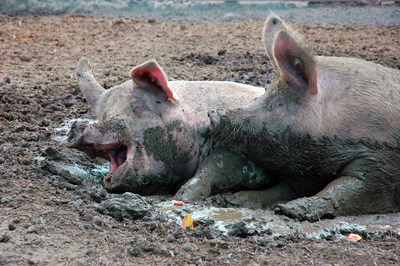Sobeys and Loblaws among those lagging on improving animal welfare says new global report
TORONTO, March 31, 2021 /CNW/ - World Animal Protection is calling on Canadian food companies to do better when it comes to farm animal welfare. The 2020 Business Benchmark on Farm Animal Welfare (BBFAW), backed by World Animal Protection and Compassion in World Farming, is the leading global measure on farm animal welfare. It ranks 150 global food companies on farm animal welfare policy and reporting. It is based on a tier system, with Tier 1 demonstrating leadership on farm animal welfare and Tier 6 indicating little or no evidence of companies acknowledging farm animal welfare as a relevant business issue.
Maple Leaf Foods is the best performing Canadian company in the report, remaining in Tier 3, the same as in 2019. The company has an overall commitment to farm animal welfare with specific policies on key animal welfare related issues including the reduction of antibiotic use and caged housing conditions for mother pigs (breeding sows).
However, it does not publish clear company-wide policies on certain key animal welfare related issues such as the avoidance of painful procedures done to animals like castration and clipping piglet tails. Nor is it clear on the provision of species-specific enrichment, such as straw for pigs or perches for chickens.
Loblaws and Sobeys came in at Tier 5. Sobeys does not have a formal animal welfare policy at all and Loblaws has limited details on the scope and implementation of an animal welfare policy.
Both companies lack company-wide policies on key animal welfare related issues including the avoidance of caged housing, reducing or avoiding routine use of antibiotics and the avoidance of painful procedures such as dehorning.
All companies were assessed on their approach to managing farm animal welfare in four areas: (1) Management Commitment, (2) Governance and Management, (3) Innovation and Leadership, and (4) Performance Reporting and Impact.
Globally, the report reveals that 59 of the 150 companies appear in the lowest tiers indicating these companies provide little or no information on their approach to farm animal welfare.
The UK has many of the strongest performing companies, including Marks & Spencer and Waitrose, showing clear leadership on their approach to farm animal welfare.
Lynn Kavanagh, Farming Campaign Manager for World Animal Protection Canada, says, "It is disappointing to see the Canadian retailers lagging behind other grocery chains such as Marks & Spencer. Farm animal welfare is important to many Canadian consumers and they expect grocery chains to play a role in moving the industry towards better on-farm animal care. Investors are also increasingly paying more attention to companies' animal welfare policies which is factoring into their investment decisions."
In addition to the poor ranking Sobeys and Loblaw received, the Retail Council of Canada (RCC) this week retracted its commitment to end caged housing for mother pigs and laying hens. Loblaws and Sobeys are part of the RCC and had committed to phase out gestation (pregnancy) crates for mother pigs by 2022 and battery cages for laying hens by 2025.
"Retailers should be leading the way and pushing for positive change within the industry, this is clearly a step backwards," says Kavanagh.
It's not clear whether Loblaws, Sobeys or any of the other retailers with RCC will keep their commitments to improved housing independent of the RCC's decision.
What is clear, is that in the past year, the links between the health of animals, people and the planet have become more obvious and more urgent. A recent UN report found that intensive farming has been responsible for more than half of all infectious diseases passing between animals and people since 1940.
Food companies that fail to see the connection are taking a big risk by ignoring their responsibilities to the animals, their customers and the planet. A One Health One Welfare approach is the direction all companies should be adapting moving forward.
Notes to Editors:
- Other Canadian companies assessed were: Saputo and Restaurant Brands International (owner of Tim Hortons, Starbucks and Popeyes) at Tier 4 and Couche-Tard at Tier 6.
- From April 2021, World Animal Protection will hand over the BBFAW baton to Four Paws International. World Animal Protection, alongside Compassion in World Farming, has steered the BBFAW since its inception in 2012.
About World Animal Protection
From our offices around the world, including China, Australia, Brazil, Kenya and Canada, we move the world to protect animals. Last year, we gave more than 220 million animals better lives through our campaigns that focus on animals in the wild, animals in disasters, animals in communities and animals in farming. For more information visit www.worldanimalprotection.ca
SOURCE World Animal Protection
News published on and distributed by:




